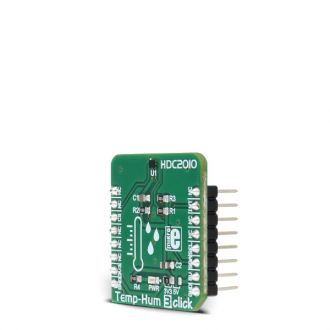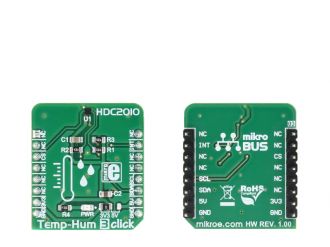
We strongly encourage users to use Package manager for sharing their code on Libstock website, because it boosts your efficiency and leaves the end user with no room for error. [more info]

Rating:
Author: MIKROE
Last Updated: 2018-03-05
Package Version: 1.0.0.0
mikroSDK Library: 1.0.0.0
Category: Temperature & humidity
Downloaded: 6786 times
Not followed.
License: MIT license
Temp-Hum 3 click is a smart environmental temperature and humidity sensor Click board, packed with features, that allows easy and simple integration into any design that requires accurate and reliable humidity and temperature measurements.
Do you want to subscribe in order to receive notifications regarding "Temp-Hum 3 click" changes.
Do you want to unsubscribe in order to stop receiving notifications regarding "Temp-Hum 3 click" changes.
Do you want to report abuse regarding "Temp-Hum 3 click".


Library Description
The library covers all functionalities of the Click board.
Key functions:
float temphum3_getTemperature() - Reads temperature from sensor
void temphum3_setMeasurement(uint8_t value) - Setup measurement parameters
void temphum3_Configuration(uint8_t value) - Setup sensor configuration
Examples Description
The application is composed of three sections:
void applicationTask()
{
Temperature = temphum3_getTemperature();
Delay_100ms();
Huminidy = temphum3_getHuminidy();
Delay_100ms();
FloatToStr(Temperature,temp_txt);
mikrobus_logWrite("Temperature : ",_LOG_TEXT);
mikrobus_logWrite(temp_txt,_LOG_LINE);
FloatToStr(Huminidy,hum_txt);
mikrobus_logWrite("Huminidy : ",_LOG_TEXT);
mikrobus_logWrite(hum_txt,_LOG_LINE);
Delay_ms( 500 );
}
Other mikroE Libraries used in the example:
Additional notes and information
Depending on the development board you are using, you may need USB UART click, USB UART 2 click or RS232 click to connect to your PC, for development systems with no UART to USB interface available on the board. The terminal available in all MikroElektronika compilers, or any other terminal application of your choice, can be used to read the message.